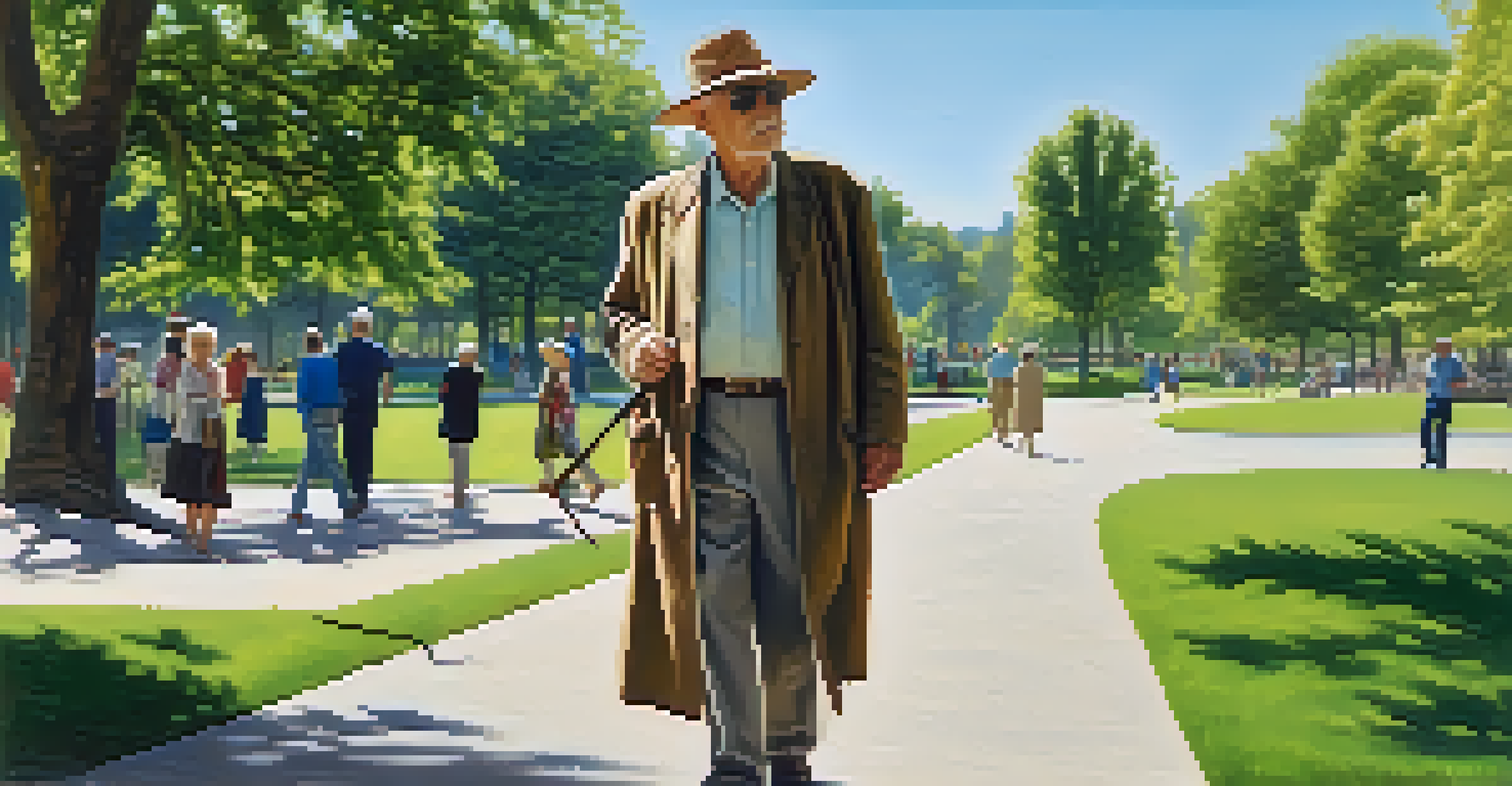Self Defense Strategies for Seniors: Staying Safe at Home

Understanding the Importance of Self-Defense for Seniors
Self-defense is not just about physical strength; it's about awareness and preparation. For seniors, these strategies can be crucial in maintaining independence and safety at home. With the right knowledge, you can reduce vulnerability and feel more secure in your environment.
The best way to predict the future is to create it.
By understanding potential risks and how to respond to them, seniors can empower themselves. Self-defense isn't merely a physical practice; it also involves mental preparedness and knowing how to identify threats. This awareness can make a significant difference in everyday situations.
Moreover, enhancing personal safety can lead to greater peace of mind. When you feel secure within your own home, it positively impacts your overall well-being. Let's explore practical self-defense strategies tailored specifically for seniors.
Creating a Safe Home Environment
The first step in self-defense is ensuring your home is a safe haven. Simple changes, like ensuring adequate lighting in entryways and using secure locks, can significantly deter potential intruders. It's essential to regularly check that all windows and doors are functioning properly and can be locked securely.

Consider installing security systems or cameras that can provide peace of mind. These systems not only serve as a deterrent but also allow you to monitor your surroundings. Additionally, having a phone or alert system within easy reach can be a lifesaver in emergencies.
Build a Support Network
Establishing a network of friends and neighbors provides emotional support and enhances safety.
Finally, declutter your living space to eliminate potential hazards. A tidy environment allows for easier movement and reduces the risk of falls. By creating a safe and secure home, you set the stage for effective self-defense.
Developing Personal Awareness and Alertness
Being aware of your surroundings is one of the most effective self-defense strategies. Practice being mindful of who is around you, especially in public spaces or when entering your home. This awareness can help you spot unusual behavior and take necessary precautions before a situation escalates.
An ounce of prevention is worth a pound of cure.
Engaging in regular activities that keep your mind sharp can also enhance your alertness. Puzzles, reading, or even engaging in conversations can help keep your cognitive skills active. The more attuned you are to your environment, the better prepared you will be to respond to potential threats.
Moreover, trust your instincts. If something feels off, don’t hesitate to act. Whether it’s changing your route home or seeking assistance, prioritizing your intuition is crucial in self-defense.
Learning Basic Self-Defense Techniques
While physical confrontation should always be a last resort, knowing basic self-defense moves can be invaluable. Consider taking a self-defense class designed for seniors, where you can learn practical techniques that focus on escaping rather than engaging. These classes often emphasize using an attacker's momentum against them.
Techniques might include how to break free from grabs or how to use your voice as a weapon. Yelling can attract attention and deter an attacker, so practicing assertiveness is key. Remember, self-defense is about empowerment, not aggression.
Self-Defense Empowers Seniors
Understanding self-defense strategies enhances seniors' safety and independence.
Additionally, practicing these techniques regularly can build confidence. The more familiar you become with these moves, the more instinctive they will be in a stressful situation. Feeling empowered in your physical abilities can make a significant difference in your overall sense of safety.
Utilizing Technology for Safety
In today’s digital age, technology can be a powerful ally in personal safety. Smartphones can be equipped with emergency apps that alert family or friends in case of distress. Familiarize yourself with these tools and ensure you have them readily accessible.
Consider carrying a personal alarm or whistle that can draw attention if you ever feel threatened. These devices are small, easy to use, and can be life-saving in a pinch. They allow you to alert others without requiring physical confrontation.
Moreover, learning how to use video calling can help you stay connected with loved ones. Regular check-ins can bolster feelings of security and community, making it easier to ask for help if needed.
Establishing a Support Network
Building a network of friends, family, and neighbors can significantly enhance your safety. Having people you can trust to check in on you regularly creates a safety net. This network not only provides emotional support but can also be a crucial resource in emergencies.
Consider starting a neighborhood watch program if you feel comfortable. This community initiative fosters communication and cooperation among residents, helping everyone feel safer. Sharing information about suspicious activities can empower everyone involved.
Create a Safe Home Environment
Implementing basic safety measures at home can significantly reduce vulnerability to intruders.
Additionally, don’t hesitate to lean on family members for assistance. Whether it's discussing safety strategies or simply having someone accompany you on outings, these connections reinforce your sense of security.
Practicing Situational Awareness Outdoors
When you're out and about, maintaining situational awareness is vital. This means being mindful of your surroundings, such as the people nearby and the activities happening around you. Keeping your head up and making eye contact with those around you can deter potential threats.
Avoid distractions while walking, such as looking down at your phone or wearing headphones. Staying alert allows you to react promptly to any unexpected situation. If you notice something suspicious, trust your instincts and seek help if necessary.

Additionally, choose well-lit and populated routes when walking or driving. If possible, travel during daylight hours and avoid isolated areas. Simple precautions can enhance your safety significantly while you're out.